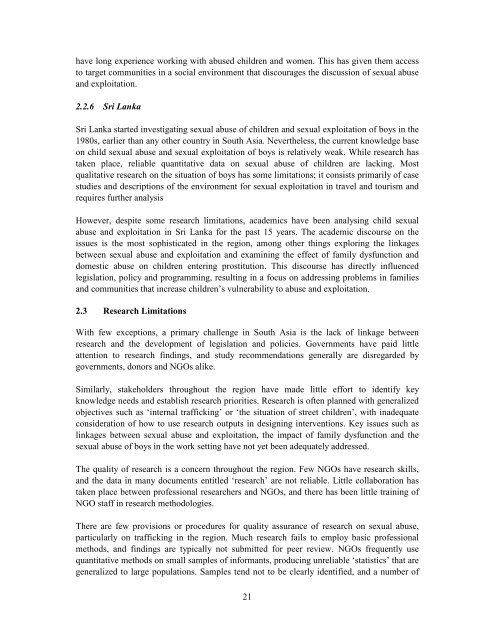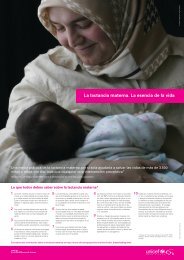SEXUAL ABUSE AND EXPLOITATION OF BOYS IN SOUTH ASIA A ...
SEXUAL ABUSE AND EXPLOITATION OF BOYS IN SOUTH ASIA A ...
SEXUAL ABUSE AND EXPLOITATION OF BOYS IN SOUTH ASIA A ...
You also want an ePaper? Increase the reach of your titles
YUMPU automatically turns print PDFs into web optimized ePapers that Google loves.
have long experience working with abused children and women. This has given them access<br />
to target communities in a social environment that discourages the discussion of sexual abuse<br />
and exploitation.<br />
2.2.6 Sri Lanka<br />
Sri Lanka started investigating sexual abuse of children and sexual exploitation of boys in the<br />
1980s, earlier than any other country in South Asia. Nevertheless, the current knowledge base<br />
on child sexual abuse and sexual exploitation of boys is relatively weak. While research has<br />
taken place, reliable quantitative data on sexual abuse of children are lacking. Most<br />
qualitative research on the situation of boys has some limitations; it consists primarily of case<br />
studies and descriptions of the environment for sexual exploitation in travel and tourism and<br />
requires further analysis<br />
However, despite some research limitations, academics have been analysing child sexual<br />
abuse and exploitation in Sri Lanka for the past 15 years. The academic discourse on the<br />
issues is the most sophisticated in the region, among other things exploring the linkages<br />
between sexual abuse and exploitation and examining the effect of family dysfunction and<br />
domestic abuse on children entering prostitution. This discourse has directly influenced<br />
legislation, policy and programming, resulting in a focus on addressing problems in families<br />
and communities that increase children’s vulnerability to abuse and exploitation.<br />
2.3 Research Limitations<br />
With few exceptions, a primary challenge in South Asia is the lack of linkage between<br />
research and the development of legislation and policies. Governments have paid little<br />
attention to research findings, and study recommendations generally are disregarded by<br />
governments, donors and NGOs alike.<br />
Similarly, stakeholders throughout the region have made little effort to identify key<br />
knowledge needs and establish research priorities. Research is often planned with generalized<br />
objectives such as ‘internal trafficking’ or ‘the situation of street children’, with inadequate<br />
consideration of how to use research outputs in designing interventions. Key issues such as<br />
linkages between sexual abuse and exploitation, the impact of family dysfunction and the<br />
sexual abuse of boys in the work setting have not yet been adequately addressed.<br />
The quality of research is a concern throughout the region. Few NGOs have research skills,<br />
and the data in many documents entitled ‘research’ are not reliable. Little collaboration has<br />
taken place between professional researchers and NGOs, and there has been little training of<br />
NGO staff in research methodologies.<br />
There are few provisions or procedures for quality assurance of research on sexual abuse,<br />
particularly on trafficking in the region. Much research fails to employ basic professional<br />
methods, and findings are typically not submitted for peer review. NGOs frequently use<br />
quantitative methods on small samples of informants, producing unreliable ‘statistics’ that are<br />
generalized to large populations. Samples tend not to be clearly identified, and a number of<br />
21










